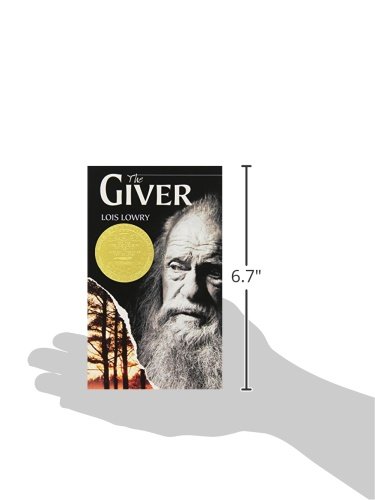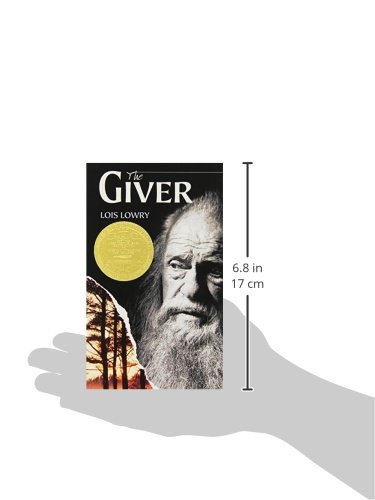




Full description not available
M**M
What does it mean to be human?
In this book's deceptively small size belies a profound impact. While geared toward young adults, it will evoke strong emotions in readers of all ages. The narrative skillfully immerses the reader in a world of intricate depth and compelling insight. Lowry created vivid images and scenes that profoundly moved me. The power of these scenes frequently made me pause, awestruck and speechless, before reflecting on their multifaceted messages and meaning.Imagine a life free from the pangs of hunger, a life where all sharp edges are smoothed away, and the sting of loss and poverty is unknown. However, it comes with a unique trade-off: your life is predetermined, a map drawn without your input. The path of your career is not yours to forge, the hand you take in marriage would be decided by another, and your children are not yours to bear, but must be given up when the time comes. The feelings of pain, sorrow, and terror are distant concepts, but in return, you do not know the sound of music, cannot see the world in color, and never get to relish in the simple moments of life, like feeling the breeze through the trees or hear birds singing. There's no war, but there's also no sunshine, rain, or seasons. Most of all, you are shielded from love. You are protected from the world's harsh realities, but at the cost of this immunity, your heart is untouched by any warmth and affection. Without the lows, the highs lose their vibrant intensity, and in return, true connection, the very essence of being human, remains forever out of reach.The human experience is deeply intertwined with our ability to make decisions and feel, and this book explores the potential consequences when those fundamental and essential human elements are removed. A world devoid of choice, decisions, or emotional depth dehumanizes us, and without it, we would have no identity or meaning.This book and its powerful message will stay with you long after the book is closed, resonating deeply and sparking meaningful discussions and thoughts.Ultimately, the book serves as a powerful reminder to question the narratives we are given in real life, whether through the media, journalism, or those in power. We should question how information is shaped and manipulated before being presented to us. The Giver encourages us to examine the world around us with a more critical eye. It is essential to critically evaluate the information we receive, especially if it is coming from a source with potential biases. May this book remind us that we need to be more open-minded to the diverse perspectives of others and to have more open dialogue and healthy discussions. In doing so, this enhances our critical thinking, empowering us all. By engaging with different perspectives and viewpoints, we empower ourselves to make informed decisions, and in return, strengthen our democracy.Bravo. 5 stars.
T**4
A Futuristic Society, Engrossing And Thought-Provoking
What is the ideal society that you can imagine? Would you like to be happy? Does a society with no war, no disease, no pain or suffering appeal to you? Would you like to have someone else choose a very compatible mate for you and not have to worry about dating? How would you like a job that is guaranteed and is enjoyable and fits your interests and personality? The Giver is about such a society. What is the trade-off? What is missing in the people’s lives? The Giver is a very thought-provoking book.Jonas lives in this community. His thought his childhood was delightful. However, at age 12, he knows he will be assigned a job. He is apprehensive about the prospect. What does he really want to do? He is not sure. Everyone in the community is assigned an occupation that suits his or her abilities. In a special ceremony, children who turn 12 years old in a given year are grouped together. He sits in the auditorium and watches and listens as all the other children in his age group are assigned jobs. Jonas is the only one left without an assignment. Is something wrong?At the end of the ceremony, he is finally called up and told he is to be a “Receiver”. This is the highest honor. He is to be trained by the Giver. The Giver is the only one in the society that has any sense of history; he is the depository of memories. The others live only in the present. The Giver is to transfer his memories of the human race to Jonas, for the Giver is old and tired and needs to be replaced.This society is one of conformity. “Sameness” is fostered and rewarded. All the houses are identical. Haircuts, dress and activities are strictly regimented. Everyone sees grayness; no one even sees colors. Only the separate job assignments differentiate the members. They are told how to act; they are told how to live. Everyone takes a pill to keep all passion at bay. Only superficial discussions of one’s feelings are allowed; only certain feelings are appropriate. The people know vaguely about “Elsewhere”, the outside world, but they stay in the Community and do as they are told.When Jonas starts receiving memories from the Giver, he experiences pain and suffering but also love and freedom of choice. He also begins to see the world in color. He is told he can lie about his training and not tell anyone what he is experiencing. Jonas is careful of what he says at home now. When he is asked if he dreams, he says “no”, because his dreams would not be acceptable. He does not tell them that he has stopped taking the pill to suppress passion. His feelings and emotions grow, and he tries to hide these from his family and the others in the Community. The Giver is the only person who knows what he is going through.Jonas thinks the other people in the Community tell the truth about their jobs. Then one day, the Giver allows him to watch a video recording of his father at work with his job taking care of infants. Jonas had always thought his Dad liked the infants that were in his care. This view was reinforced since his father brought home an infant named Gabriel who needed some extra care. Gabriel was not learning to sleep through the night; he was different than the other infants in the ward. If he did not learn to sleep through the night he would be RELEASED. Jonas soothes the boy to sleep by acting as Giver and sending the child peaceful thoughts. The child does not sleep when he is in the new infant ward, however. Jonas learns that Gabriel is to be RELEASED.In the infant ward, twins have been born. Twins are not allowed in the Community. Only one of the twins can be kept. The other is be RELEASED. Jonas watches as his father weighs each of the twins and sets aside the smaller of the two. Then his father calmly injects the smaller twin in the head with a lethal chemical. The boy dies. Jonas is devastated. He had always looked up to his father. Jonas now knows what RELEASED means. He had thought that those who were RELEASED, including the disabled and the elderly went to a heavenly place in another community. Jonas now knows that RELEASED means death. Shocked and scared, Jonas knows that his father has been lying to everyone about what he does. Is everyone lying about his or her work?Jonas is disillusioned and decides to leave the Community, something that is forbidden. He realizes that the Community is a horrible place; it is a dystopia, not a Utopia. Jonas hoards some leftover food (all leftover food must be put out in front of each house) and prepares for the right opportunity.The Giver helps him escape. He escapes with Gabriel and is pursued by helicopters. Freezing and nearly starving, they reach a hill and look down upon a lit up house below. A family is sitting cozily in a living room with a lovely Christmas tree. The scene is a memory that Jonah had received from the Giver. Is this real or is it just a memory? Are Jonah and Gabriel safe in “Elsewhere” or are they dead?What information is kept from us in today’s world? It is easy to see distortions of truth in our media. Misinformation is spread rapidly though the Internet as well as television, and, probably, our newspapers. We see many different cultures in the world, and they all have their version of reality.Medical doctors often give tranquilizers and antidepressants to dull patients’ emotions. There is some parallel here to the pill that every 12 year-old child in the Community must start to take daily to get rid of passionate feelings. Does not great art and music need passion and intense feelings to be inspired?
Trustpilot
3 weeks ago
5 days ago